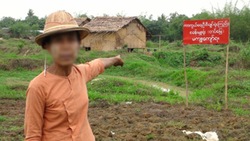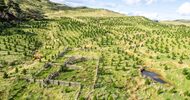Irrawaddy | 22 Janaury 2014

Govt not recognizing scale of land-grabs in Burma: lawmakers
By LAWI WENG
RANGOON — The Burmese government has acknowledged just a fraction of more than 6,000 land-grab complaints filed with a parliamentary committee, lawmakers say, with a cabinet official telling Parliament this week that total complaints numbered less than 800.
Ohn Than, the deputy minister for agriculture and irrigation, told Parliament on Tuesday that there were only 745 cases of land rights abuses, and claimed that the government had already resolved some 423 of the complaints.
Members of a parliamentary land investigation committee are not satisfied with Ohn Than’s math, and are urging the deputy minister to explain in detail how the government intends to address the thousands of outstanding cases.
“We will have a meeting with all our committee members. We will discuss what we should do next. We should send a letter of objection to the government over this,” said Mi Myint Than, a lawmaker from the All Mon Region Democracy Party.
The parliamentary land investigation committee was formed in early 2012, and committee members have since been collecting data on the ground in all 14 of Burma’s states and divisions. Mi Myint Than, who is also a member of the committee, said Ohn Than was grossly underestimating the scale of the problem.
“We proposed over 6,435 letters to them for cases of land abuse, but they said they only received over 700 letters. So, how we can trust them?” he said. “Where are the rest of our proposed letters?”
Pe Than, an MP for the Rakhine Nationalities Development Party (RNDP) and another member of the land committee, said more specifics were needed on the 423 complaints purportedly solved as well.
“They just say they’ve solved cases already, but how? They should give details to us case by case, about when and where they solved them. We were not made aware of it [the land dispute resolutions]. Why not?” he asked.
“We’ve found that they [the government] does not want to give back land to the people because they know the land has a lot of value and will be good to sell in the future.”
The issue of land confiscations has made it to the floor of the legislature in the course of every session of Parliament since President Thein Sein came to power in March 2011, with more and more lawmakers feeling pressure from constituents and emboldened by the democratic reforms of the nominally civilian government.
The military, which ruled Burma with an iron fist for more than 50 years, has often been the target of land-grab complaints, prompting one unelected military MP to put the kibosh on discussion of the issue in August, during the last session of Parliament.
“Repeatedly saying that the Army confiscated land is creating a divide between the Army and the people,” Kyaw Oo Lwin complained at the time. But speaking before lawmakers on Tuesday, Ohn Than acknowledged the disproportionate culpability, reporting that 565 of the 745 complaint cases recognized by the government involved land confiscations by the military.
Countless cases of farmers and other landowners having property seized by the military, private companies or used for national projects over the last half-century have made the issue a priority for parliamentarians.
Ever since the 1963 Land Acquisition Act, which nationalized ownership of all land across the country, confiscations have be widespread for various reasons—including project construction, urban expansions, establishment of industrial zones and building army bases.
The issue, which governments across Southeast Asia have grappled with in recent years, poses a particularly acute threat to livelihoods in Burma, an agricultural country where the majority of people are farmers. No one has had the right to protest land seizures during the last five decades of military rule in Burma, but recent political reforms mean that many victims have begun to speak up in an effort to get confiscated land returned.
“There are persons from the government who are rich after selling land confiscated from the people. But the land-grab victims are still poor and they want their land back,” Pe Than said.

A woman points to land which, according to the sign, is now owned by the Burma Army. (Photo: The Irrawaddy)
Govt not recognizing scale of land-grabs in Burma: lawmakers
By LAWI WENG
RANGOON — The Burmese government has acknowledged just a fraction of more than 6,000 land-grab complaints filed with a parliamentary committee, lawmakers say, with a cabinet official telling Parliament this week that total complaints numbered less than 800.
Ohn Than, the deputy minister for agriculture and irrigation, told Parliament on Tuesday that there were only 745 cases of land rights abuses, and claimed that the government had already resolved some 423 of the complaints.
Members of a parliamentary land investigation committee are not satisfied with Ohn Than’s math, and are urging the deputy minister to explain in detail how the government intends to address the thousands of outstanding cases.
“We will have a meeting with all our committee members. We will discuss what we should do next. We should send a letter of objection to the government over this,” said Mi Myint Than, a lawmaker from the All Mon Region Democracy Party.
The parliamentary land investigation committee was formed in early 2012, and committee members have since been collecting data on the ground in all 14 of Burma’s states and divisions. Mi Myint Than, who is also a member of the committee, said Ohn Than was grossly underestimating the scale of the problem.
“We proposed over 6,435 letters to them for cases of land abuse, but they said they only received over 700 letters. So, how we can trust them?” he said. “Where are the rest of our proposed letters?”
Pe Than, an MP for the Rakhine Nationalities Development Party (RNDP) and another member of the land committee, said more specifics were needed on the 423 complaints purportedly solved as well.
“They just say they’ve solved cases already, but how? They should give details to us case by case, about when and where they solved them. We were not made aware of it [the land dispute resolutions]. Why not?” he asked.
“We’ve found that they [the government] does not want to give back land to the people because they know the land has a lot of value and will be good to sell in the future.”
The issue of land confiscations has made it to the floor of the legislature in the course of every session of Parliament since President Thein Sein came to power in March 2011, with more and more lawmakers feeling pressure from constituents and emboldened by the democratic reforms of the nominally civilian government.
The military, which ruled Burma with an iron fist for more than 50 years, has often been the target of land-grab complaints, prompting one unelected military MP to put the kibosh on discussion of the issue in August, during the last session of Parliament.
“Repeatedly saying that the Army confiscated land is creating a divide between the Army and the people,” Kyaw Oo Lwin complained at the time. But speaking before lawmakers on Tuesday, Ohn Than acknowledged the disproportionate culpability, reporting that 565 of the 745 complaint cases recognized by the government involved land confiscations by the military.
Countless cases of farmers and other landowners having property seized by the military, private companies or used for national projects over the last half-century have made the issue a priority for parliamentarians.
Ever since the 1963 Land Acquisition Act, which nationalized ownership of all land across the country, confiscations have be widespread for various reasons—including project construction, urban expansions, establishment of industrial zones and building army bases.
The issue, which governments across Southeast Asia have grappled with in recent years, poses a particularly acute threat to livelihoods in Burma, an agricultural country where the majority of people are farmers. No one has had the right to protest land seizures during the last five decades of military rule in Burma, but recent political reforms mean that many victims have begun to speak up in an effort to get confiscated land returned.
“There are persons from the government who are rich after selling land confiscated from the people. But the land-grab victims are still poor and they want their land back,” Pe Than said.














